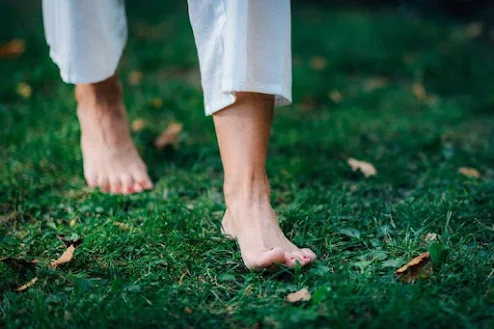Benefits of Walking Barefoot (Earthing) for Your Body and Mind
In our fast-paced modern lives, it’s easy to feel disconnected—from ourselves, from nature, and even from the ground beneath our feet. But what if the simple act of walking barefoot could help restore that connection and boost both your physical and mental wellbeing?
This is where earthing, also known as grounding, comes in. It’s not just a wellness trend—it’s a practice backed by growing research and centuries of traditional wisdom.
In this post, we’ll explore what earthing is, its science-backed benefits, and how you can easily incorporate it into your daily routine for better health.
What Is Earthing?
Earthing or grounding refers to the practice of physically connecting your body to the Earth’s surface—usually by walking barefoot on natural surfaces like grass, soil, or sand.
The idea is simple: our bodies build up positive electrical charges from exposure to electronics, pollution, and synthetic materials. The Earth, however, carries a negative charge. By making direct contact with it, you can help balance your body’s energy, much like grounding an electrical system.
The Science Behind Earthing
Though it might sound a bit “woo-woo,” there’s actually solid science behind earthing. Studies have shown that grounding the body can lead to measurable physiological changes, including:
-
Reduced inflammation
-
Lowered cortisol (stress hormone) levels
-
Improved sleep and heart rate variability
-
Enhanced mood and energy levels
When you walk barefoot, free electrons from the Earth’s surface enter your body, which may help neutralize the oxidative stress and inflammation caused by free radicals.
A 2012 study published in the Journal of Environmental and Public Health found that grounding could improve sleep, reduce pain, and enhance overall wellbeing.
Physical Benefits of Walking Barefoot
1. Improves Posture and Balance
When you ditch the shoes, your feet naturally engage more muscles. Over time, this helps strengthen foot and leg muscles, improve posture, and enhance balance—especially beneficial if you’re active or prone to back pain.
2. Reduces Inflammation
As mentioned, grounding may reduce chronic inflammation, a root cause of many modern diseases including arthritis, diabetes, and heart disease.
3. Promotes Better Sleep
By helping regulate your body’s cortisol rhythms, earthing can support deeper, more restful sleep. Many people report falling asleep faster and waking up more refreshed after regular barefoot walks.
4. Supports Heart Health
Studies show that earthing may reduce blood viscosity (thickness), which is a major risk factor for cardiovascular problems. Simply connecting to the Earth could support a healthier heart.
Mental and Emotional Benefits
1. Reduces Stress and Anxiety
Nature itself is calming, but walking barefoot amplifies that effect. Grounding helps bring your nervous system out of “fight or flight” and into rest and digest mode, promoting a deep sense of calm and clarity.
2. Boosts Mood and Energy
The physical contact with the Earth helps regulate serotonin levels—a key hormone that influences mood. Many people feel a mental “reset” after even just 10–15 minutes of earthing.
3. Enhances Mindfulness
Walking barefoot forces you to slow down and be present. You’ll feel the texture of the earth, the coolness of the grass, or the warmth of sand. This naturally encourages mindfulness and a stronger connection to your environment.
How to Start Earthing (Even If You Live in a City)
You don’t need to move to the countryside to enjoy the benefits of earthing. Here are some easy ways to get started:
-
Walk barefoot in your backyard, a local park, or at the beach
-
Stand on grass or soil while meditating or stretching
-
Sit or lie on the ground during outdoor breaks
-
Use earthing mats or sheets if natural surfaces aren’t easily accessible
👉 Aim for at least 15–30 minutes a day of barefoot contact with the earth for optimal benefits.
A Few Things to Keep in Mind
-
Be cautious of sharp objects or hot surfaces when walking barefoot outdoors.
-
If you have diabetes or any condition that affects foot sensitivity, consult your doctor first.
-
Start slow—your feet may take time to adjust if you’re used to wearing shoes all the time.
Final Thoughts: Reconnect with the Earth
Walking barefoot might feel strange at first, especially if you’ve spent years in shoes. But once you get used to it, it can become a grounding and energising daily ritual.
Earthing is free, accessible, and backed by both ancient traditions and modern science. It’s a simple way to support your mental clarity, reduce inflammation, and feel more alive and connected—just by touching the Earth.
So take off your shoes, step outside, and feel the healing power of nature beneath your feet.







